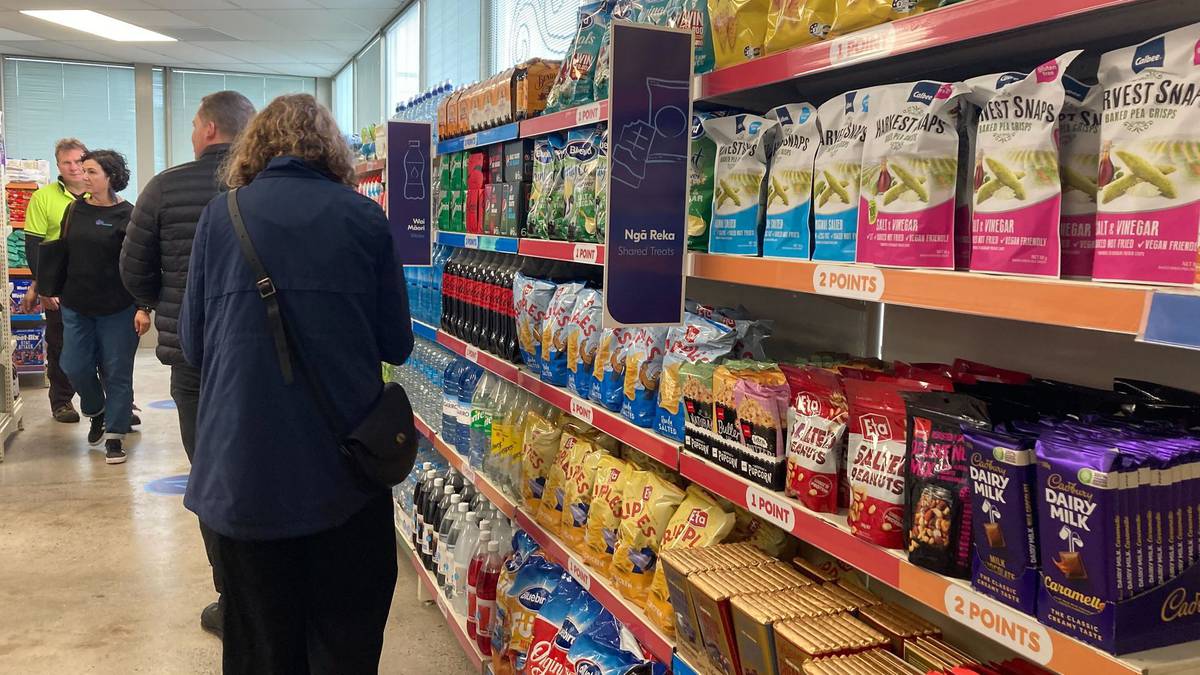The shelves of the new social supermarket in Whangārei, where points replace prices. Photo / Jaime Lyth
Northland’s second supermarket without price tags will give struggling families a choice of kai free of charge.
The new social supermarket on Woods Rd, Whangārei, opened yesterday and aims to bring the dignity of choice and independence to accessing free food.
“They lead their whānau, they know what their whānau need in their household,” 155 Whare Āwhina food coordinator Samantha Cassidy said.
Whare Kai is a partnership between support service 155 Whare Āwhina and supermarket chain Foodstuffs North Island.
The 155 Open Arms Day Centre had been providing between 90 and 150 free food parcels a week to those in need in Whangārei through its food bank.
The service will replace the food bank and bring a more “inclusive process” to receiving food support.
“It’s a nice response, it’s better than the foodbank and being handed kai they don’t want.
“It’s cheaper for us too, because they get to choose the kai – we’re not wasting the kai we give them,” Cassidy said.
Those referred to the supermarket can select the kai they want from the shelves as if they were shopping at an ordinary supermarket, minus the need for money.
Instead of prices, there is a point system based on the needs of the household.
/cloudfront-ap-southeast-2.images.arcpublishing.com/nzme/YFKNJO2NP6F25I3V3RRFGWEBO4.jpg)
This is Foodstuffs North Island’s fourth social supermarket partnership, two of which are in Northland.
The opening of the Whangārei shop follows the Wellington City Mission Social Supermarket, Te Hiku Pātaka in Kaitaia – in partnership with Te Kahu Oranga Whānau and the Tokoroa Social Supermarket – in partnership with BBM.
Community members Kiritopa Wapu and Carmen Taurerewa came down for the supermarket’s opening, which they thought was a step in the right direction.
“The worst is people who are working or on the benefit and still struggling and they do get whakama [ashamed] to come to places like this and there’s no need to be because we all struggle to make ends meet sometimes,” said Taurerewa.
“Society looks at the struggle as a bad thing, if you’re coming here there’s something wrong, but no it’s not, it’s just you can’t afford it,” Wapu said.
Everyone’s version of common sense is different, and working out what food to buy can be difficult if you have trouble reading or never had money to spend in the supermarket growing up, noted Wapu.
“Nobody’s educating people on how to shop these days,” Wapu said.
Staff will help shoppers make decisions on the food in the store, all donated by Foodstuffs, and that food isn’t picked at random.
“We look at the stores in the area and work out what are the top products that end up in people’s baskets and we replicate that here,” Foodstuffs head of membership experience Willa Hand said.
“The important thing is we want the food to be things that people want, not what someone’s prepared to give away,” said Here for NZ Foodstuffs chairman Matt Heap.
/cloudfront-ap-southeast-2.images.arcpublishing.com/nzme/M7B6S46PWFQT3JJSS5N5EDJJFY.jpg)
New Zealand is experiencing its largest annual spike in food prices in 13 years, according to Stats NZ.
“We’ve got specific measures that we do to keep inflation under control and especially with our staples and essentials,” Heap said about food cost increases.
While social supermarkets will bring relief to those who are able to be referred, those who don’t will still have to face supermarket prices.
“It is heartening to see supermarkets supporting new ‘social supermarkets’ and taking steps to support New Zealanders struggling with cost-of-living pressures.
“However, what we really want to see is lower prices across the board,” said Jessica Walker, Consumer senior communications and campaigns adviser said.
The Commerce Commission report into the retail grocery market found the duopoly was making excess profits of $1 million a day.
“Those profits are hitting all New Zealand households, hard,” Walker said.
The cost of food now ranks second highest on a list of financial concerns, behind housing payments according to Consumer NZ’s sentiment tracker.
Last year, food ranked as the eighth-highest concern.
“We are hopeful steps taken by the government, the announcement of a Grocery Commissioner and Grocery Industry Competition Bill, make it clear that the supermarkets can’t keep making super profits at the expense of struggling consumers,” Walker said.




